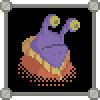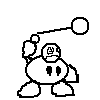 |
Castle Paradox
|
| View previous topic :: View next topic |
| Author |
Message |
Mr B
Joined: 20 Mar 2003
Posts: 382
|
 Posted: Thu Mar 16, 2006 4:09 pm Post subject: Methods of Personality Development in RPGs Posted: Thu Mar 16, 2006 4:09 pm Post subject: Methods of Personality Development in RPGs |
 |
|
Whilst playing one of the KotORs a while back, I was struck (and a little frustrated) by the fact that a player character that was developed to be entirely John Wayne could at any point in the game suddenly turn around and be horrendously evil, with no character justification for doing so.
Why would game designers permit actions that are so incongruous? (excluding time and money constraints) I would expect that a system would be implemented that would provide some sort of continuity enforcement, but there was little (except LS/DS mastery bonuses) to induce characters to develop personalities. This irritated me for a while, but I finally realized what the game was up to.
In every game where a character has a personality, something -- or someone -- has to be responsible for expressing that personality (in this case, primarily consistency of decisions). In some games -- FFVI, example -- the characters' personalities are entirely prefabricated. In other games -- KotOR -- the personalities are entirely up to the player's choice.
I realized that it's not an issue of the character not having a personality, it's that the responsibility of personality consistancy was given to the player, not the game. By eliminating any form of enforcement, the developers hoped the player would more closely identify with the character as an extension of the self. Personality is all in the player's head.
All well and good, but what is the middle road? How can personalities be developed such that the player can determine the outcome, but the characters' personalities function separately from the players' momentary desires?
I suppose that the simplest way to do this would be to put personality development choices into a spectrum; most simplistically, a monodimensional spectrum in the good-evil dimension. Each choice in a choice node would have different locations on the spectrum, and the character has access only to the choices within a certain distance of his "location" on the good-evil spectrum. Each choice tends to tilt the character's morality in the direction of the choice. In this method, characters could gradually alter their stance, but would not be able to make sudden radical departures from their established nature.
Perhaps an XP bonus (or some other desirable) could be associated with decisions, with the size of the bonus dependent on the degree of dissociation from neutrality (or whatever the default, unformed location in the middle of the dimension is). All possible decisions in a decision node could be made available, but the players' min-max tendancies will lead to a consistent method of play. Perhaps an XP reduction could be associated with decisions radically different from the established norm.
How many people actually function this way? Does anyone just gradually slide around from extremes of one position to another? What if decisions and situations possessed levels expressing the effect they have on the person (minor, notable, dire). Dire decisions are choices that have a dramatic affect on the character; these are the life-changing decisions. Notable decisions are choices that can affect in very noticable ways, but don't really rewrite our core beings. Minor decisions are the choices that we are faced with on a day-to-day basis; they have an effect on who we are, but they are noticed mainly when they build up over time.
Each level of decision is constrained by the level more immediately significant; minor decisions by notable ones, notable decisions by dire ones. No amount of minor decisions can change the character's stance beyond a certain distance from the position that the notable decisions put it at, and no amount of notable decisions can change the character's stance beyond a certain distance from the position that the dire decisions put it at. Dire decisions are unconstrained, but they don't come along very often -- probably a handful of times per game, if that.
A system of this sort would eliminate the strange and unrealistic gradual slide towards extremes of personality development, though it still suffers from the monodimensionality inherent to the system. Would it work in a game, or would it serve to confuse and irritate players?
What other methods of personality development would be good to see around? Is personality best controlled by the developers, the gamers, or some combination of the two? |
|
| Back to top |
|
 |
Camdog
Joined: 08 Aug 2003
Posts: 606
|
 Posted: Fri Mar 17, 2006 6:44 am Post subject: Posted: Fri Mar 17, 2006 6:44 am Post subject: |
 |
|
I really think it's best to have entirely prefrabricated character personalities. I know this chafes at the notion of "role playing", but the fact is, computers just don't have the ability to properly model personality. As it stands, the more complex you allow personality changes in your game, the more situations you have to code for, and creating a program that comes anywhere close to actual personality development is essentially impossible.
The solution is to restrict how much development you can put into the character (as you put it, modeling character development on a one-dimensional 'good and evil' axis). This always seems so forced and artificial to me. I'd much rather have one really good character than the choice of developing into a variety of artificial and mediocre ones.
Which brings me to my second point: if you leave character development in the hands of the player, it is, quite simply, possible for the player to develop a shitty character, or at least a character that doesn't work very well within the context of the story you're trying to tell. Why do you think Fable was such a let down? I know around here it's in vogue to say that gameplay trumps story, but the fact is that story is important in CRPGs, and throwing a character who's personality is dictated on the player's whims is a great way to fuck up your nicely crafted tale.
Truly dynamic character generation is only possible in pen and paper RPGs, and really only rarely even then, if the GM is truly kick ass. For a computer game, give me a good story and good, predefined characters that tell that story well. |
|
| Back to top |
|
 |
Battleblaze
Warrior Thread Monk

Joined: 19 Dec 2003
Posts: 782
Location: IndY OHR
|
 Posted: Fri Mar 17, 2006 7:32 am Post subject: Posted: Fri Mar 17, 2006 7:32 am Post subject: |
 |
|
In CPVS the main guy has a preset basic personality. He's a good guy he's prett easily confused and has a strong sense of justice. But when you start the game he's pretty much blank (classic amnesia cliche') but during the intro level he learns alot about the world he's in and alot of 'moral bulding' goes on. So the player feels and know why he has a sense of justice and loyalty. I think it ties the player in more with the game when they actually go through the events that shape the resolve of the hero. So in effect the personality is preset. But in an open ended way...
Hope that made sense...
_________________
Indy OHR! and National OHR Month Contest going on now!
"Aeth calls PHC an anti-semite; PHC blames anti-semitism"
-squall |
|
| Back to top |
|
 |
Moogle1
Scourge of the Seas
Halloween 2006 Creativity Winner


Joined: 15 Jul 2004
Posts: 3377
Location: Seattle, WA
|
 Posted: Fri Mar 17, 2006 12:29 pm Post subject: Posted: Fri Mar 17, 2006 12:29 pm Post subject: |
 |
|
Let me get this straight... basically you're saying it's a linear game. Got it.
I've always favored the "spectral proximity" thing, but this line of discussion brings me to think of something new! What if your character's past was dynamically generated based on the choices you made in the first couple of hours of the game? For example, when you beat up a guy at a bar, you get a flashback later on of how your dad used to come home drunk and that made you really sad as a kid. The game then makes you RP in agreement with the new understanding you have of your character.
Dynamically generated backstories! What will I think of next?
_________________
|
|
| Back to top |
|
 |
Mr B
Joined: 20 Mar 2003
Posts: 382
|
 Posted: Fri Mar 17, 2006 1:09 pm Post subject: Posted: Fri Mar 17, 2006 1:09 pm Post subject: |
 |
|
| Moogle1 wrote: | | For example, when you beat up a guy at a bar, you get a flashback later on of how your dad used to come home drunk and that made you really sad as a kid. The game then makes you RP in agreement with the new understanding you have of your character. |
Brilliant! This could produce a really great synthesis between player control and developer control. I hope you can use it somewhere...it's a powerful idea.
A variation on this process could be used to allow the player to customize the character without having an actual character-construction screen at the beginning of each game. Instead of specifically stating that a character is a Red Knight of the House of Basin, it could come out in the dialogue in the beginning of the game.
| Camdog wrote: | | I know this chafes at the notion of "role playing", but the fact is, computers just don't have the ability to properly model personality. |
Eh, that's true. No digital approximation of personality will appear real. Of course, no digital approximation of combat will appear real, or flight, or farming. They can be modelled through some basic rules of systems, but humans are far less deterministic...and complicated, at that. Be that as it may, it's still fun to try.
In order to simply behaviour and interactions, what if character interaction were given a couple layers of approximation? Instead of Charles the Jester accusing Beuford the Herald of ripping his tunic, the player could simply be informed that Chuck and Biff are arguing again. All of the conversation scripting would be done away with and replaced by a (relatively) simple interaction web (or what-have-you).
Of course, this depends on the degree of separation between the player and the characters. It could easily be done in a condor's-eye-view game where the player is relatively detached from the moment-by-moment actions of the characters and most of the text is relayed in dissociated text boxes. It would be difficult and aukward in a FFVI setting. It would probably be impossible in an over-the-shoulder KotOR-like game where everything is voiced-over and the player expects precise details.
| Camdog wrote: | | Which brings me to my second point: if you leave character development in the hands of the player, it is, quite simply, possible for the player to develop a shitty character, or at least a character that doesn't work very well within the context of the story you're trying to tell. |
What if there were in-gameplay restrictions to enforce certain norms of behaviour? I don't mean artificial constraints; I mean the world is constructed so that you simply have to conform in a certain way. The police shoot if you kill townspeople. The mayor won't talk if you raid people's houses.
If the characters' personalities are entirely pre-scripted, would you still have a relatively open-ended battle system, or would you prefer such-and-such a skill to be learned at this specific level, and this character has access to only these abilities, and so on? |
|
| Back to top |
|
 |
Camdog
Joined: 08 Aug 2003
Posts: 606
|
 Posted: Fri Mar 17, 2006 1:47 pm Post subject: Posted: Fri Mar 17, 2006 1:47 pm Post subject: |
 |
|
| Mr. B wrote: | What if there were in-gameplay restrictions to enforce certain norms of behaviour? I don't mean artificial constraints; I mean the world is constructed so that you simply have to conform in a certain way. The police shoot if you kill townspeople. The mayor won't talk if you raid people's houses.
If the characters' personalities are entirely pre-scripted, would you still have a relatively open-ended battle system, or would you prefer such-and-such a skill to be learned at this specific level, and this character has access to only these abilities, and so on? |
I think this is actually the best way to handle it. It gives the player the illusion of control without allowing them to turn the game into a train-wreck. As far as abilities go, I definitely prefer them to be open-ended, as that tends to be the meat of the game and can be seperated from personality.
Ideally, I like a game with strong character that tells a strong story but still allows me freedom to explore the game world within those confines (ie multiple optional quests/plot branches). In this case you have freedom of motion combined with a good tale. A well defined main character isn't restrictive; I think it adds a lot. |
|
| Back to top |
|
 |
Gizmog1
Don't Lurk In The Bushes!

Joined: 05 Mar 2003
Posts: 2257
Location: Lurking In The Bushes!
|
 Posted: Fri Mar 17, 2006 2:35 pm Post subject: Posted: Fri Mar 17, 2006 2:35 pm Post subject: |
 |
|
| You know, I can see that working too, Moogs. If I were playing a game, and did something, and the computer showed me something weird from the player's past, trying to justify it, I might not do it again, just out of "Aw shit, that's not what I meant". It's definitely worth investigating. |
|
| Back to top |
|
 |
Jack
the fool

Joined: 30 Jul 2004
Posts: 773
|
 Posted: Sun Mar 19, 2006 11:06 am Post subject: Posted: Sun Mar 19, 2006 11:06 am Post subject: |
 |
|
The second time I went through KotOR, I went through the first 75% of the game good. Then, after the big plot twist, I abrubtly went bad (just to go along with the storyline for the 2nd one). Although it was just a game, they make you feel pretty bad for what you do; especially since everyone was so encouraged by my actions.
What helps to enforce is definitely a background. Fable always gives you a great emotional pain, accompanied by two powerful choices. My family is murdered; do I get my revenge on the darkness, or do I see fault in the light? Some people might just be greedy; large sum of gold over a few measly peasant lives.
I like that idea of your past being made up as you play, Moog. Very nice.
_________________
 |
|
| Back to top |
|
 |
LeRoy_Leo
Project manager
Class S Minstrel

Joined: 24 Sep 2003
Posts: 2683
Location: The dead-center of your brain!
|
 Posted: Sun Mar 19, 2006 5:12 pm Post subject: Posted: Sun Mar 19, 2006 5:12 pm Post subject: |
 |
|
I like making descissions that change the game world, but I don't think text is the best way to present it. Moogle's idea is golden. Using a cut scene instead of text. Actions beat words. That is all (don't wanna reveal too many secrets). <.<
_________________
Planning Project Blood Summons, an MMORPG which will incinerate all of the others with it's sheer brilliance...
---msw188 ---
"Seriously James, you keep rolling out the awesome like gingerbread men on a horror-movie assembly line. " |
|
| Back to top |
|
 |
Battleblaze
Warrior Thread Monk

Joined: 19 Dec 2003
Posts: 782
Location: IndY OHR
|
 Posted: Mon Mar 20, 2006 7:36 am Post subject: Posted: Mon Mar 20, 2006 7:36 am Post subject: |
 |
|
Moogman, CPVS is semi-linear. While you do follow the main story line, it also has different sidequest that'll somewhat effect the game world (some fancy tag work and this can be done pretty smoothly).
_________________
Indy OHR! and National OHR Month Contest going on now!
"Aeth calls PHC an anti-semite; PHC blames anti-semitism"
-squall |
|
| Back to top |
|
 |
Setu_Firestorm
Music Composer

Joined: 26 Mar 2003
Posts: 2566
Location: Holiday. FL
|
 Posted: Mon Mar 20, 2006 7:45 am Post subject: Posted: Mon Mar 20, 2006 7:45 am Post subject: |
 |
|
Geez, Moogle. I'm surprised nobody's thought of that one. Hmmm
/me gets ideas......
Anyhoo, usually what I do, which I did with the characters to Hoshima, is created them with they're balanced and quirky personalities, and then said, "Okay, if I take these two and put them in a room together, what would come of it?" I found that when I ask that question, it makes it easier to fine-tune the rough aspects of their personalities along with it making the game more fun to make and play.
With that said, I'll include that it is a good idea to make sure that there's usually someone in the party who's arrogant and/or self-righteous and someone in the party who's a complete idiot or just sarcastic comic relief. That little formula tends to make it possible for you to have a serious story but work in some comic quirks that make the dialogue more enjoyable.
_________________

Facebook: http://www.facebook.com/georgerpowell
Newgrounds: http://setu-firestorm.newgrounds.com |
|
| Back to top |
|
 |
Mr B
Joined: 20 Mar 2003
Posts: 382
|
 Posted: Mon Mar 20, 2006 1:47 pm Post subject: Posted: Mon Mar 20, 2006 1:47 pm Post subject: |
 |
|
Yeah, pre-developed personalities definitely seems to have an advantage in a story-telling sense.
So, what if a game had prewritten personalities, but the interaction between characters could vary? On a simple level, let's say each character had a like-meter towards every other character. The events and decisions that occur could affect their attitudes towards each other, thus tending to affect their interactions.
Doing this would still require a lot of alternative interactions scripting, but much less so than complete personality development. Could it function?
Specifically, I am thinking of a game where each hero in the active party grants certain unique bonuses to the other active heroes based on the friendliness of their relationship. For example, let's say that Lady Alice's unique bonus is in Wisdom. Lady Alice is pretty buddy-buddy with Colonel Bellroy because he saved her father from drowning, so he gets a +20 Wisdom bonus. Lord Rudtree is a personal enemy of hers because he ordered the execution of a friend she believed to be innocent, so he doesn't get any bonus at all. Charles Bruinwall is a minor aquaintance, she's seen him assist people in need, so he gets a +5 Wisdom bonus. If Colonel Bellroy's bonus stat is Dodge, then Lady Alice would get a high Dodge bonus, and other people would get other bonuses depending on their amicability.
On a strategic level this is all well and good, but would it work on a storytelling level? My expectation is that it would require a good bit of regimentation so as to make certain that the interactions are tightly defined. A big, sprawling argument between twelve characters would probably be prohibitive due to the multitudinous possibilities, but a two- or three-way interaction could probably be easily done. |
|
| Back to top |
|
 |
chris98

Joined: 23 Feb 2005
Posts: 114
Location: On Jupiter, My rubber Boobie, s45 h79
|
 Posted: Mon Mar 20, 2006 9:53 pm Post subject: Posted: Mon Mar 20, 2006 9:53 pm Post subject: |
 |
|
Star Ocean did it with PAs. It worked well, and they were hilarious!!!
_________________
ANIME FREAK!!!!!! LOLOLOLOLOLOLOL DIS RO><ORS!!!
Come to http://firaga.conforums3.com for discussions about RPGs, old and new alike. We need members. |
|
| Back to top |
|
 |
LeRoy_Leo
Project manager
Class S Minstrel

Joined: 24 Sep 2003
Posts: 2683
Location: The dead-center of your brain!
|
 Posted: Mon Mar 20, 2006 10:33 pm Post subject: Posted: Mon Mar 20, 2006 10:33 pm Post subject: |
 |
|
It seems that building a story and characters from the bottom up and/or as you play is the best way to keep story and gameplay from killing each other.
If you have a predefined story but characters that players can mold, you get an incompatable character. If you have an undefined story and defined characters, you get an incompatible story. WOOHOO!
Don't go there. <.<
I seem to recall that on Fire Emblem, characters could build relationships and become stronger when they fight with each other. So, between a couple characters, this has been proven doable. FE is a fairly old game too. With three or more characters, it would require a lot more thought and process.
Also, "Stay alive" looks completely retarded. Thank you.
_________________
Planning Project Blood Summons, an MMORPG which will incinerate all of the others with it's sheer brilliance...
---msw188 ---
"Seriously James, you keep rolling out the awesome like gingerbread men on a horror-movie assembly line. " |
|
| Back to top |
|
 |
Gizmog1
Don't Lurk In The Bushes!

Joined: 05 Mar 2003
Posts: 2257
Location: Lurking In The Bushes!
|
 Posted: Mon Mar 20, 2006 11:12 pm Post subject: Posted: Mon Mar 20, 2006 11:12 pm Post subject: |
 |
|
| Man, can you imagine if Shadow's dreams changed based on what you'd done? What you'd made him do? Jesus, I'm shivering just thinking of what could the possibilities are. |
|
| Back to top |
|
 |
|
|
You cannot post new topics in this forum
You cannot reply to topics in this forum
You cannot edit your posts in this forum
You cannot delete your posts in this forum
You cannot vote in polls in this forum
|
Powered by phpBB © 2001, 2005 phpBB Group
|




